Ducks are cute, entertaining, and lay delicious eggs to boot. They’re not nearly as popular as dogs, cats, or even parrots, but they make wonderful, unique pets.
Not for everyone, though.
It’s important to know what ducks are like and have realistic expectations for your pet ducks before you dive in. In this article, I’ll share some things I think are essential for any prospective duck owner to know before getting any ducks.
Disclosure: This post contains affiliate links. As an Amazon Associate, I earn a commission if you purchase something through a link on this post, at no additional cost to you.
1. You can’t have a pet duck.
I said A pet duck. You can have pet ducks.
Many people have a dog, a cat, a parrot, a hamster, or whatever, but ducks are different. You can’t have one duck. Ducks are flock animals and will be lonely living alone. A human companion, even a “bonded” one, isn’t an appropriate replacement.
Yes, of course, some people do it, and I’m not saying their ducks are necessarily unhappy, especially if they have constant human company, but that doesn’t mean you should, if you have the choice. Ducks need a companion (or two, or more) of their own kind.
2. Ducks are not house pets.
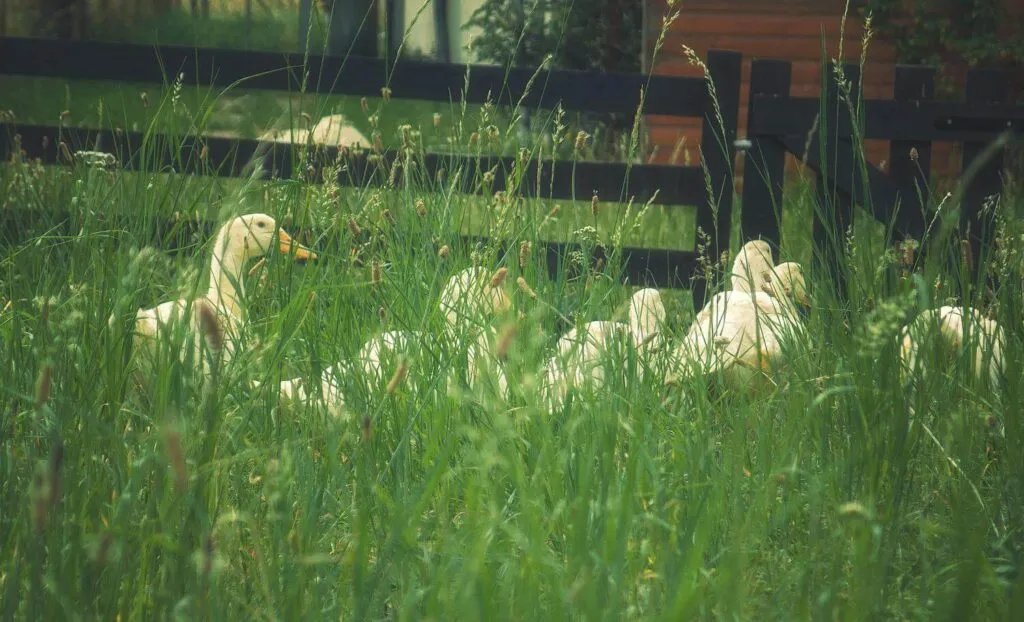
Happy ducks living the sort of life ducks like to live!
Ducks are not suited to living indoors. They love being outside. Their little feetsies should be on grass, not hard surfaces. They need sunshine and a place to explore and forage. Even though they may need to be kept in a coop or indoor enclosure for the night for their own protection, most ducks don’t like being indoors more than necessary and would rather sit outside in the snow or rain than be in a coop.
Many pet duck owners like to bring them inside occasionally, but ducks should not live indoors full-time. If you don’t have outdoor space, don’t get ducks.
Also, ducks cannot be potty-trained. Some people put “duck diapers” on their ducks during their indoor visits, but these cannot be worn all the time.
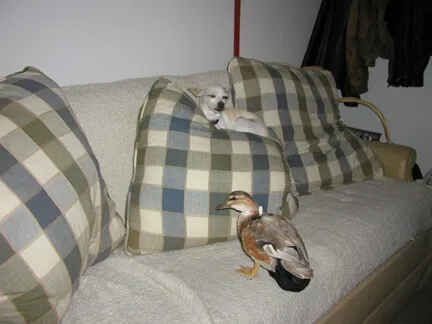
A Call duck wearing a diaper. Photo credit: “Sitting on the couch…” (CC BY-NC-ND 2.0) by Glenn Kraeck
Here are some things to keep in mind if you’d still like your ducks to be part-time indoor pets: 9 tips and tricks for keeping indoor pet ducks
3. Ducks aren’t automatically friendly and cuddly.
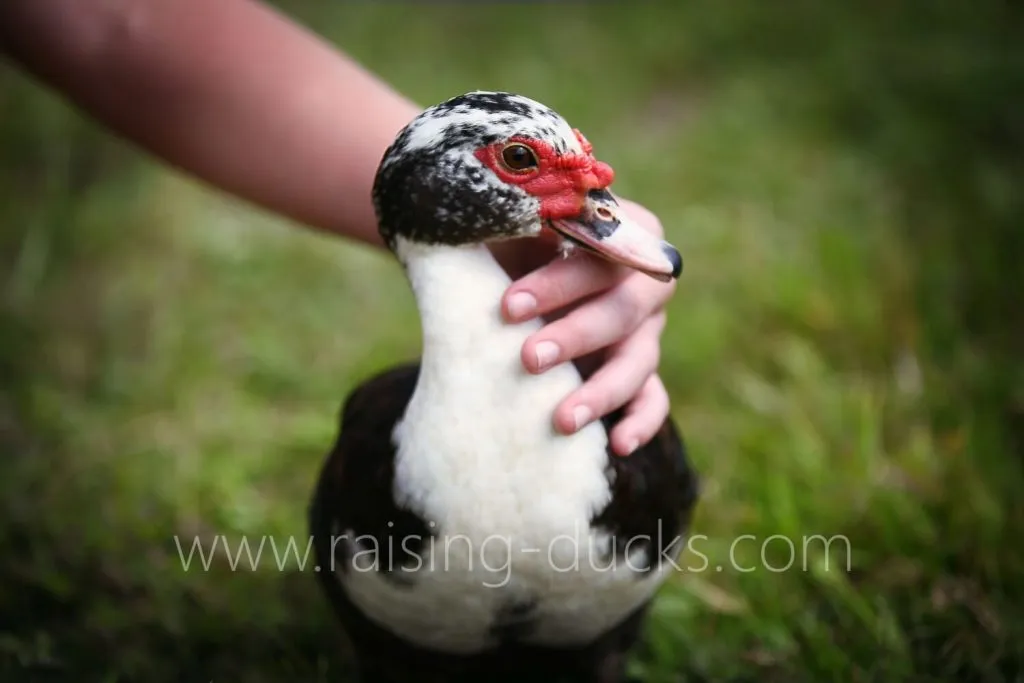
One of my Muscovy ducks, Sugar. She’s okay with a bit of petting, but doesn’t like being picked up.
Ducks make great pets, but they don’t love being petted, cuddled, and picked up like many dogs and cats do.
By nature, they’re skittish and afraid of humans. They need frequent, careful handling to be tame. Some ducks, especially hand-raised ones, tolerate being petted, and some even seem to like a little bit of gentle petting or scratching. But you can’t expect your ducks to be friendly by default. Even many hand-raised ducks don’t like being petted or picked up.
4. Ducks are loud.
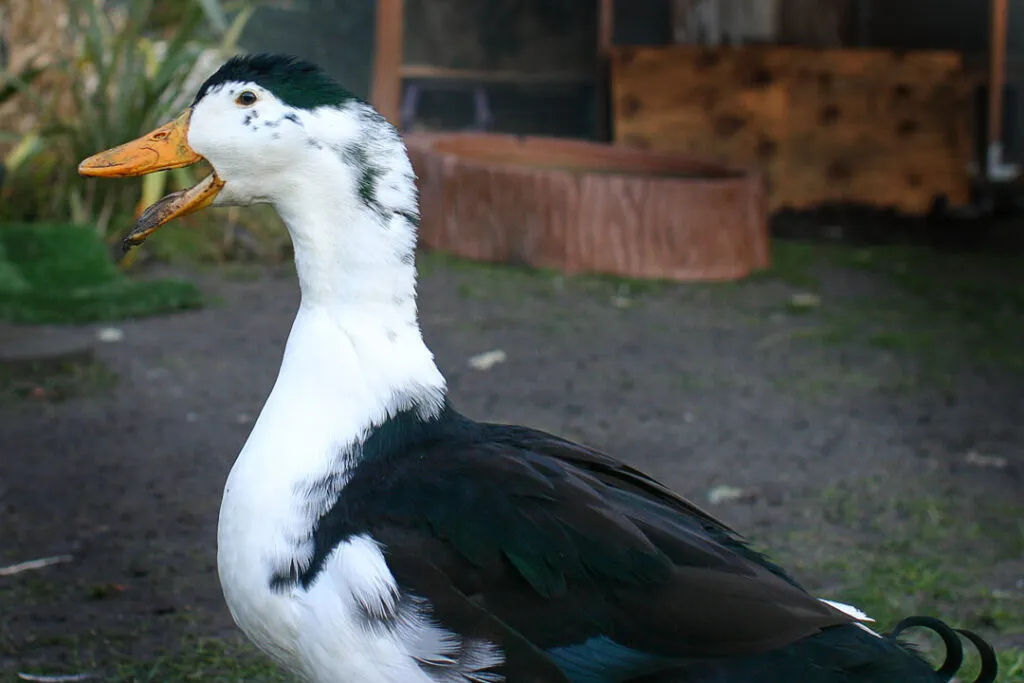
Photo credit: “Aaaaaak!” (CC BY-NC-ND 2.0) by tifotter
Ducks quack a lot, throughout the day and often throughout the night, and quacks are loud. There’s not much you can do about their noise, either. If you don’t like noise, or if you have close neighbors, ducks may not be a great option for you.
There are two alternatives: drakes and Muscovies.
A drake’s quack is soft and raspy, much less likely to annoy anyone. You can keep an all-drake bachelor flock if you want quiet pets.
Muscovy ducks don’t really quack at all, and the sounds they make are pleasant and very quiet.
5. Ducks are very messy.
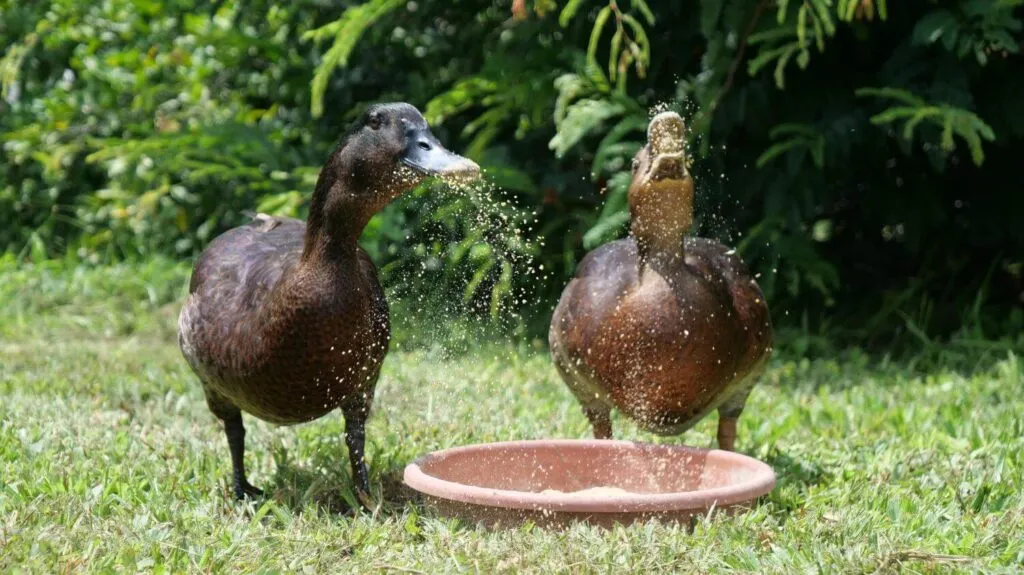
Derek and Dalgona have little to no table manners. Derek talks with his mouth full too.
If you’re used to chickens, or cats or dogs or pretty much any other pet for that matter, you may not be prepared for how messy ducks are.
For one thing, they poop every 10 to 30 minutes. This is not an exaggeration, but a fact.
Then there’s water. If there’s one thing ducks like more than water, it’s spreading water. If they have a bathing area, they will splash and fling water a considerable distance from said bathing area. Then they will dabble in the spilled water, damaging all vegetation and creating mudholes. With water sources too small to bathe in, they will still do their best to spill it and spread it as much as possible.
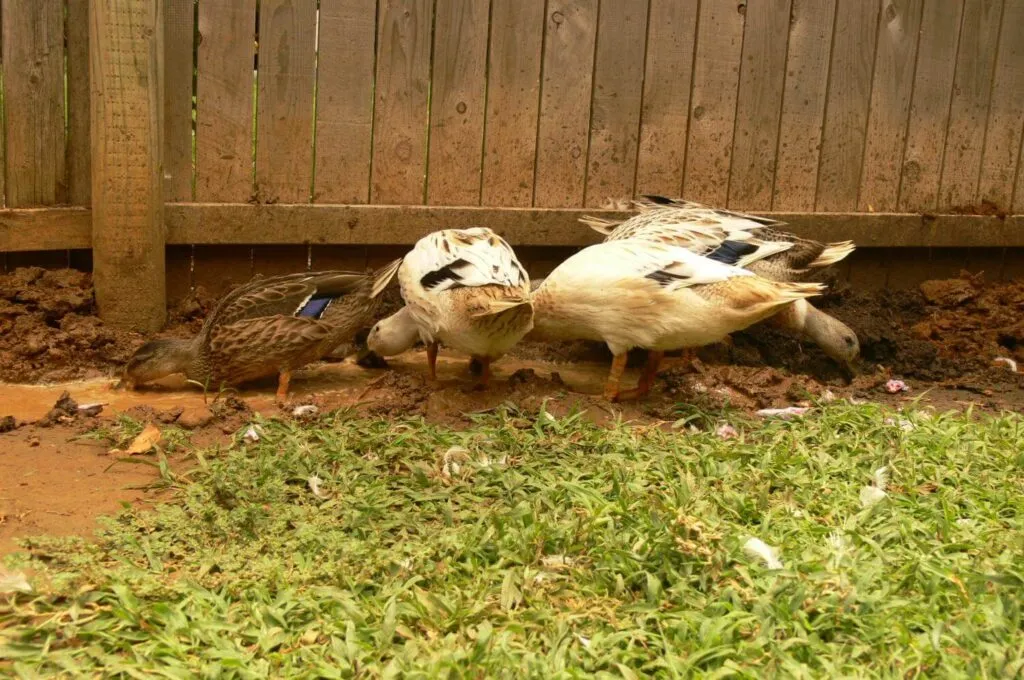
There isn’t much ducks like better than dabbling in mud. Photo credit: “Flock Sifting” (CC BY-NC 2.0) by April Shuyler
Then there’s food. Ducks are not civilized eaters. They sometimes spill more than they swallow, and throw their food around almost as much as they throw water around. They will also put their food in their water.
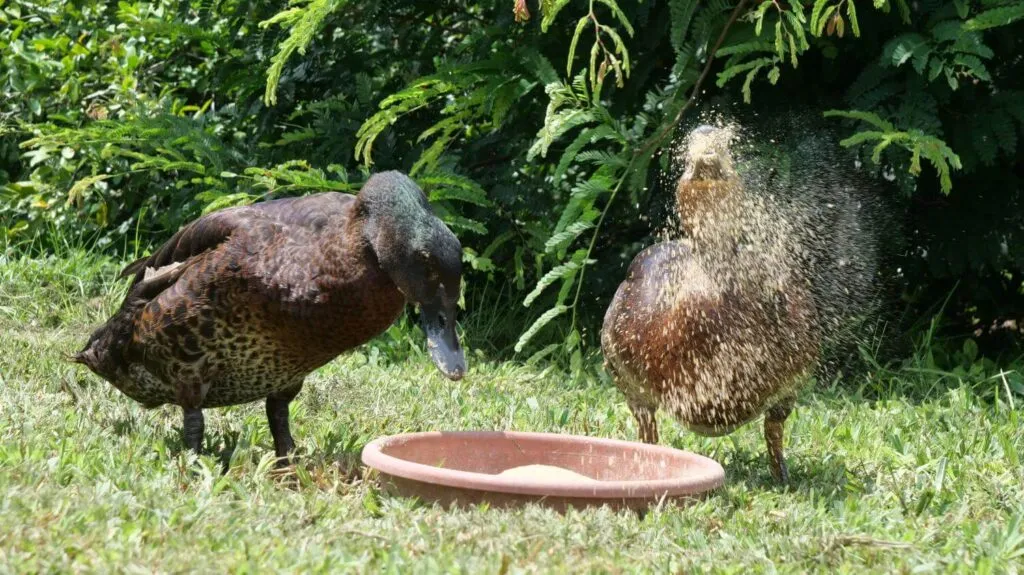
Bonus photo of Dalgona spilling more than she’s eating. That’s just how ducks roll. (Wetting or soaking their feed helps reduce such wastage.)
6. You cannot dump them.
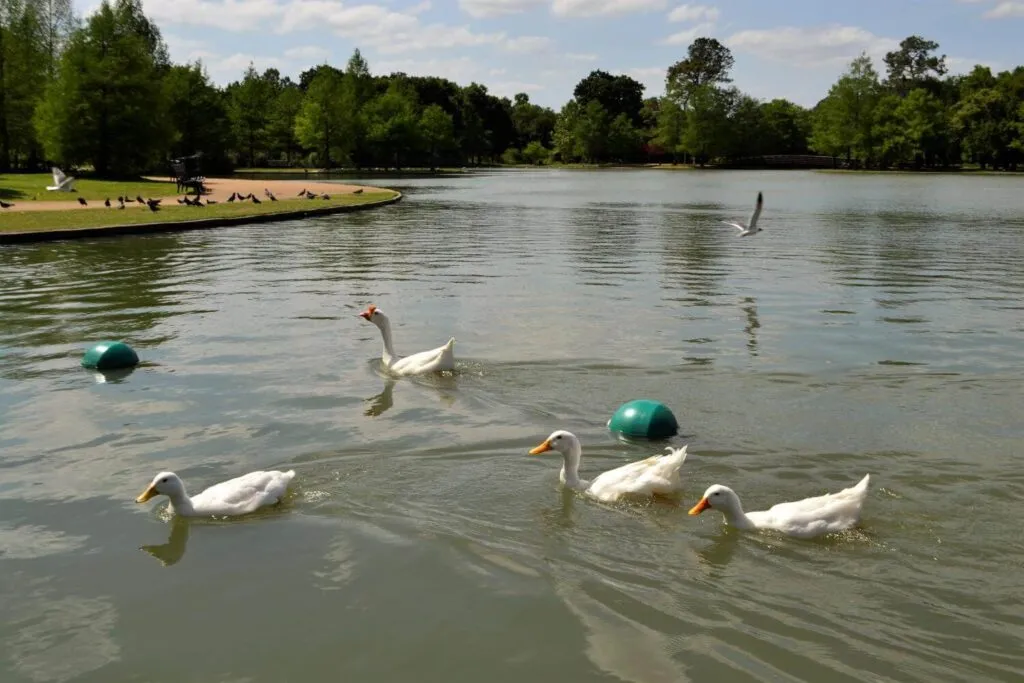
These ducks might look happy, but the chances of long-term survival are low for domestic, human-raised ducks that are dumped.
Some people, sadly, think they can release ducks “into the wild” when they don’t want them anymore—usually once the cute, fluffy duckling stage has passed.
This is cruel. Ducks that are raised by humans won’t know how to find their own food. Hand-raised domestic ducks are completely reliant on their human providers. If dumped, they will almost certainly die of starvation or predation within a year.
Yes, ducks forage instinctively. But domestic ducks, especially ones that have been bred for unnatural weight or high egg production, can’t forage enough to sustain themselves, especially without being taught how.
Just because your local pond has feral ducks doesn’t mean that your ducks will be able to live there too. For one thing, those ducks are often young ducks that haven’t encountered their first winter yet. The ducks that are surviving in places like that are usually the ones that were hatched there and are accustomed to the wild life.
Also, dumping ducks is illegal.
7. Don’t get them because “eggs are expensive.”
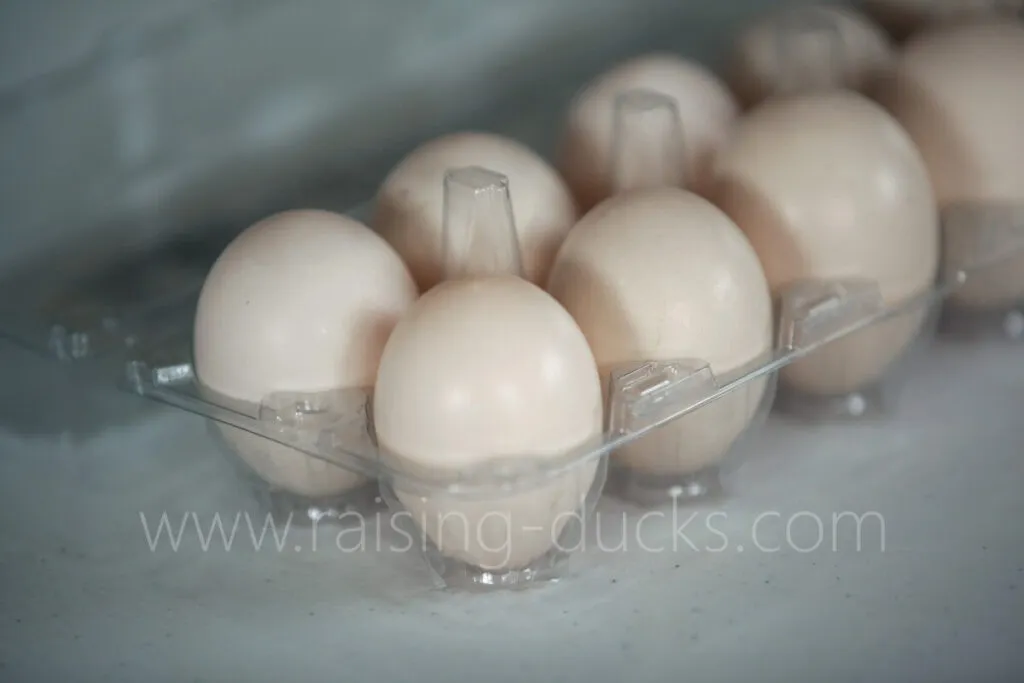
Duck eggs are amazing!
Some people get chickens or ducks with the idea that they’ll save money on eggs.
You won’t.
Commercial egg “factories” produce eggs as cheaply as they can produce them.
The price of eggs has primarily gone up in recent times because the price of feed has gone up. There are ways to save money on feed costs and other expenses, but most backyard poultry raisers don’t even break even. It is possible, but difficult.
Keep in mind, also, that your ducks will lay the most during their couple first years, after which their yearly egg production will gradually decline. Furthermore, eggs are actually naturally a seasonal product. Some breeds of ducks are better at laying during the winter than chickens, but most will still stop or slow down for part of the year. Not many ducks will lay year-round.
8. It’s difficult to find medical care for ducks.
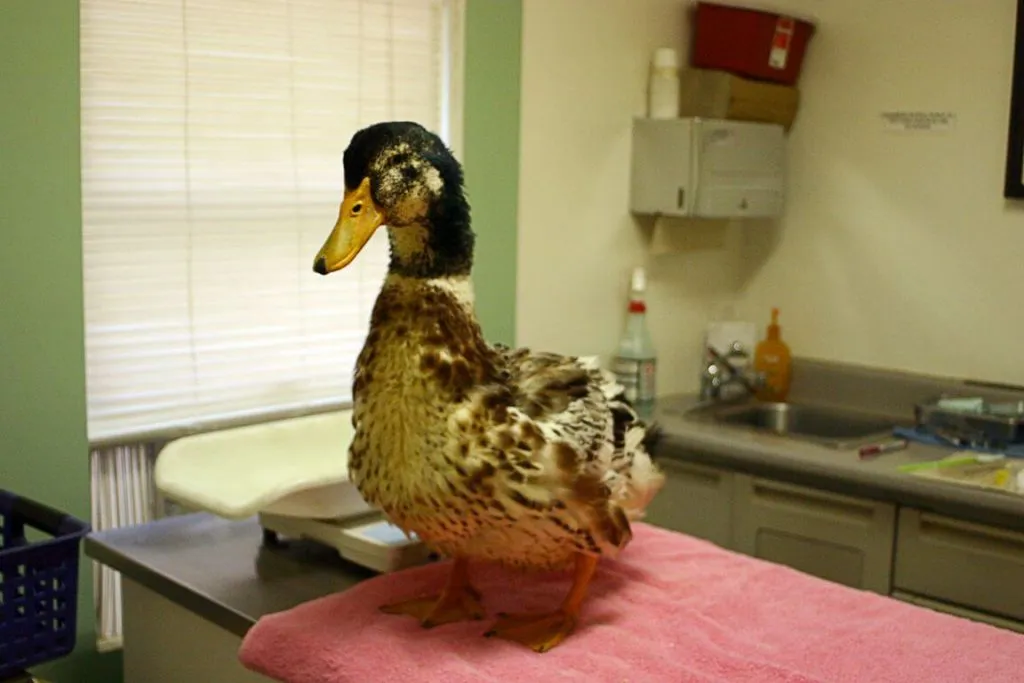
A pet duck at a vet’s office. Photo credit: “Mean Lady took me to the Vet” (CC BY-NC-ND 2.0) by tifotter
Very few veterinarians have knowledge of waterfowl healthcare. Most vets won’t see ducks at all, and those that do usually don’t know much about them. Even avian vets are often not very knowledgeable about ducks.
Finding a good vet for a pet duck can be difficult, if not impossible. Many people find themselves on their own when their ducks get injured or sick. Fortunately, many common duck maladies can be treated at home without a medical professional’s help, if you know what to do and how to do it.
I recommend getting this book:
Its section on duck healthcare is better than anything else I’ve seen. It’s a great book for any pet duck owner.
9. Drakes can be difficult to deal with.

Drakes will fight with each other.
Not that female ducks are never difficult to deal with, but there are several issues drakes can cause that you need to be aware of before you get ducks, so you can plan ahead accordingly.
They can be aggressive to humans. Some drakes may bite, chase, or even try to fight with you. This can be avoided or dealt with, but it’s often something new duck owners, who haven’t learned duck body language and psychology well, struggle to deal with. Here’s an article about dealing with drake aggression.
Drakes will also fight with other drakes. You can’t have two or more drakes in a flock unless they have plenty of females to go around (either that or no females at all) and ample space available. This means that if you buy ducklings and don’t know their sex, you are likely to end up with two or more drakes and will then need to either separate them or find a new home for them.
Multiple drakes can also overmate and even kill female ducks. In most cases, you will need at least four females per drake, especially if you have more than one drake, but sometimes even if you only have one. It doesn’t always work to keep a pair of one male and one female.
It’s possible to keep an all-drakes bachelor flock. Sometimes this works well and sometimes it doesn’t; not all individuals will get along. But since many duck owners end up with unwanted drakes, starting an all-drake flock can be a great option for people who want pet ducks and would like to help ducks that need homes.
Rehoming extra drakes is very difficult, so it’s good to have a plan for what you will do with your drakes if you can’t keep them.
10. Research ducks!
This article is far from everything you need to know before you get ducks. Keep reading and keep learning!
Be sure to research their housing and feeding needs. Learn how much space they need, how to keep them safe from predators, why you probably shouldn’t buy a prefabricated coop, how much ventilation ducks need, how to provide swimming water, what supplements ducks need, and what treats and snacks are safe for them. Learn about the many different duck breeds. Learn about duck eggs and egglaying habits.
Here are some links to get you started:
New to Ducks? 20 Things You Need to Know
Duck Housing: Everything You Need to Consider
Leave a comment
Your email address will not be published.